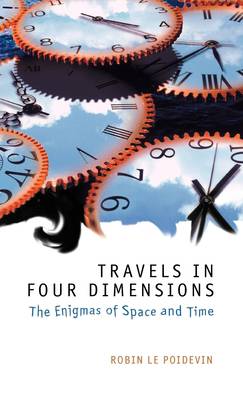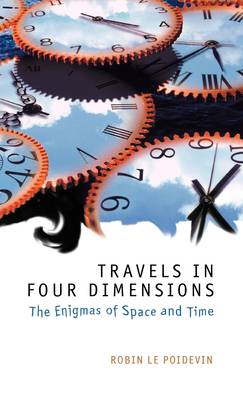
- Afhalen na 1 uur in een winkel met voorraad
- Gratis thuislevering in België vanaf € 30
- Ruim aanbod met 7 miljoen producten
- Afhalen na 1 uur in een winkel met voorraad
- Gratis thuislevering in België vanaf € 30
- Ruim aanbod met 7 miljoen producten
Zoeken
€ 138,45
+ 276 punten
Uitvoering
Omschrijving
Space and time are the most fundamental features of our experience of the world, and yet they are also the most perplexing. Does time really flow, or is that simply an illusion? Did time have a beginning? What does it mean to say that time has a direction? Does space have boundaries, or is it infinite? Is change really possible? Could space and time exist in the absence of any objects or events? What, in the end, are space and time? Do they really exist, or are they simply the constructions of our minds?
Robin Le Poidevin provides a clear, witty, and stimulating introduction to these deep questions and many other mind-boggling puzzles and paradoxes. He gives a vivid sense of the difficulties raised by our ordinary ideas about space and time, but he also gives us the basis to think about these problems independently, avoiding large amounts of jargon and technicality. His book is an invitation to think philosophically rather than a sustained argument for particular conclusions, but Le Poidevin does advance and defend a number of controversial views. He argues, for example, that time does not actually flow, that it is possible for space and time to be both finite and yet be without boundaries, and that causation is the key to an understanding of one of the deepest mysteries of time: its direction.
Drawing on a variety of vivid examples from science, history, and literature, Travels in Four Dimensions brings to life some of the most profound questions imaginable.
Robin Le Poidevin provides a clear, witty, and stimulating introduction to these deep questions and many other mind-boggling puzzles and paradoxes. He gives a vivid sense of the difficulties raised by our ordinary ideas about space and time, but he also gives us the basis to think about these problems independently, avoiding large amounts of jargon and technicality. His book is an invitation to think philosophically rather than a sustained argument for particular conclusions, but Le Poidevin does advance and defend a number of controversial views. He argues, for example, that time does not actually flow, that it is possible for space and time to be both finite and yet be without boundaries, and that causation is the key to an understanding of one of the deepest mysteries of time: its direction.
Drawing on a variety of vivid examples from science, history, and literature, Travels in Four Dimensions brings to life some of the most profound questions imaginable.
Specificaties
Betrokkenen
- Auteur(s):
- Uitgeverij:
Inhoud
- Aantal bladzijden:
- 275
- Taal:
- Engels
Eigenschappen
- Productcode (EAN):
- 9780198752547
- Verschijningsdatum:
- 7/08/2003
- Uitvoering:
- Hardcover
- Formaat:
- Genaaid
- Afmetingen:
- 162 mm x 210 mm
- Gewicht:
- 412 g

Alleen bij Standaard Boekhandel
+ 276 punten op je klantenkaart van Standaard Boekhandel
Beoordelingen
We publiceren alleen reviews die voldoen aan de voorwaarden voor reviews. Bekijk onze voorwaarden voor reviews.







